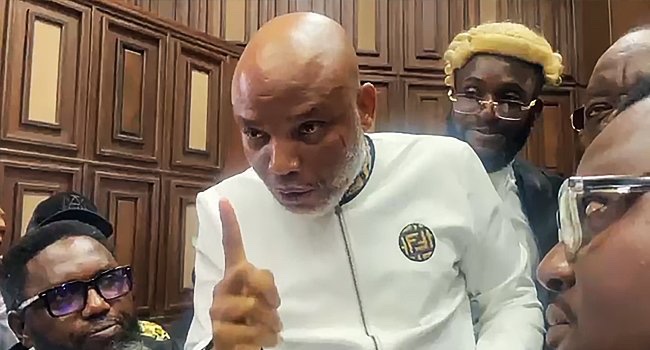
Nnamdi Kanu Seeks Transfer to Abuja Hospital Amid Mounting Health Concerns

The detention of Nnamdi Kanu, the embattled leader of the Indigenous People of Biafra (IPOB), has once again returned to the center of Nigeria’s national debate. Court filings this week reveal that Kanu is seeking a judicial order to transfer from the Department of State Services (DSS) facility where he has been held since 2021, to the National Hospital in Abuja, citing urgent medical needs.
For many of his supporters, the application is a humanitarian plea. For others, it is another chapter in the long and bitter standoff between the Nigerian state and one of its most vocal separatist figures. Either way, the case forces Nigeria to confront old wounds that have never truly healed.
Kanu’s health concerns have been raised repeatedly by his legal team, who insist that the conditions of DSS detention are worsening his medical state. Though details remain tightly guarded, family members and allies have spoken of ailments that require specialist care unavailable in the security service’s medical wing. The DSS, for its part, has consistently insisted that it is providing adequate treatment. The court will now decide if his transfer to a public hospital is warranted.
To understand why this request has sparked such intense reactions, one must revisit Kanu’s turbulent journey. In June 2021, he was dramatically extradited from Kenya under circumstances still clouded in secrecy and controversy, accused of fueling violence through IPOB’s campaign for an independent Biafran state. Since then, he has remained in DSS custody, facing terrorism-related charges and repeated adjournments that many of his supporters see as deliberate attempts to break his spirit.
The broader conflict, however, cannot be understood in isolation from Nigeria’s history. When Nigeria gained independence from Britain in 1960, it was celebrated as the dawn of true self-rule. Yet critics like Kanu argue that the Nigeria Independence Act 1960 was more of a transfer of administrative control than genuine sovereignty. British influence remained embedded in political structures, economic frameworks, and even the armed forces, leaving behind a fractured nation-state struggling to define its identity.
It is this historical grievance that forms the philosophical backbone of IPOB’s agitation. The group leans heavily on Article 1(2) of the United Nations Charter, which enshrines the right of peoples to self-determination. To IPOB, this legitimizes their push for secession. To Abuja, it threatens national unity and fuels unrest in a region already scarred by the memory of the Biafran War.
And unrest has indeed followed. Data from the Armed Conflict Location & Event Data Project (ACLED) paints a grim picture: since 2016, over 1,200 conflict incidents have been linked to IPOB activities. These range from protests and sit-at-home orders to violent clashes between security forces and suspected separatists. The toll has been heavy, particularly in the South-East, where ordinary citizens are caught in the crossfire between a federal government determined to preserve national unity and a separatist movement unwilling to abandon its cause.
Against this backdrop, Kanu’s medical plea is more than a personal request — it is a test of Nigeria’s willingness to balance justice, security, and humanitarian obligations. Supporters argue that denying him proper medical care risks creating a martyr, further inflaming tensions. Critics counter that granting him special privileges could embolden IPOB and weaken the state’s authority.
Public opinion remains sharply divided. On social media, hashtags like #FreeNnamdiKanu and #JusticeForBiafra trend regularly, with heated debates between pro-Biafra voices and staunch nationalists. Diaspora groups in London, Washington, and Berlin continue to stage protests, amplifying IPOB’s grievances on an international stage. Meanwhile, in Nigeria’s south-east, fear lingers that every new development in Kanu’s case could trigger another round of unrest.
Legal analysts note that while humanitarian considerations should be paramount, the Nigerian state has historically resisted showing flexibility when dealing with separatist leaders. Past figures, from Odumegwu Ojukwu to Ralph Uwazuruike, have faced similar resistance, their movements often met with crackdowns rather than dialogue.
As the court deliberates, one truth is undeniable: Nigeria stands at a crossroads. Will the judiciary prioritize Kanu’s right to health, or will the state’s obsession with control once again override humanitarian concerns? For a country grappling with economic hardship, spiraling insecurity, and waning public trust, the stakes go far beyond one man’s hospital transfer.
In the end, Nnamdi Kanu’s case symbolizes more than a legal battle. It is the embodiment of Nigeria’s unfinished journey from colonial rule to true nationhood — a reminder that old ghosts from 1960 still haunt the federation. Whether he is moved to a hospital or kept in DSS custody, the question remains: will Nigeria confront its past to find peace, or will it continue down the path of repression and unrest?

